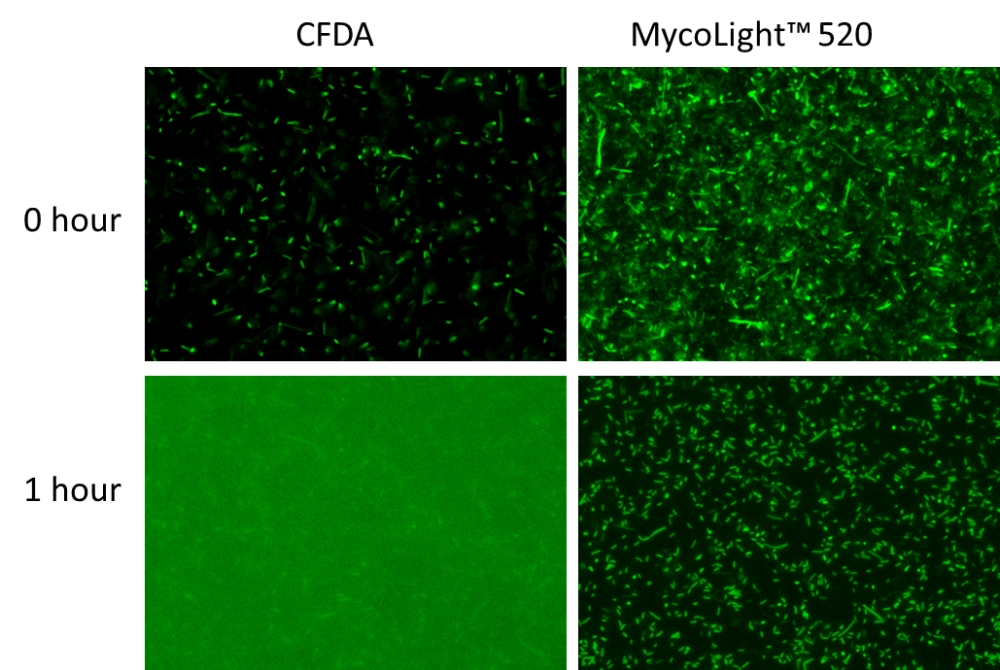上海金畔生物科技有限公司代理AAT Bioquest荧光染料全线产品,欢迎访问AAT Bioquest荧光染料官网了解更多信息。
MycoLight 活细菌荧光成像试剂盒价格 4245
产品规格
产品货号

| Ex (nm) | 498 | Em (nm) | 526 |
| 分子量 | – | 溶剂 | – |
| 存储条件 | – |
MycoLight 活细菌荧光成像试剂盒是美国AAT Bioquest生产的用于检测细菌的试剂盒,MycoLight 活细菌荧光成像套件提供了一种简便方法,可通过荧光显微镜可视化活细菌。 MycoLight 520是一种非荧光酯酶底物,可扩散到革兰氏阳性菌和革兰氏阴性菌中。 通过细菌细胞内非特异性酯酶水解后,会产生绿色荧光产物,并在细菌内积累。 与常用的酯酶底物CFDA和CFDA-AM相比,该试剂盒可提供更明亮,更稳定的信号,具有更低的背景和更容易的染色方案。金畔生物是AAT Bioquest的中国代理商,为您提供优质的MycoLight 活细菌荧光成像试剂盒。
点击查看光谱
适用仪器
| 荧光显微镜 | |
| Ex: | 488 nm |
| Em: | 530 nm |
| 推荐孔板: | 黑色透明底板 |
| 通道: | FITC 通道 |
样品实验方案
简要概述
1.准备100X染料储备溶液
2.准备细菌样品
3.添加MycoLight 520
4.将细菌样品与MycoLight 520信号增强剂在黑暗中于37°C孵育5-10分钟或在室温下孵育60分钟
5.通过带有FITC滤光片组的荧光显微镜分析样品
溶液配制
1.储备溶液配制
所有未使用的储备溶液应分为一次性使用的等分试样,并在制备后储存在-20°C下。 避免重复冻融循环。
1.1MycoLight 520储备液(100X):
将100 uL DMSO(组分D)添加到MycoLight 520(组分A)小瓶中,制成100X储备液。
样品示例及操作
1.准备细菌样品,浓度范围为106到108个细胞/ ml。在适当的培养基中使细菌生长到对数后期。通过以10,000 x g离心10分钟除去培养基,然后将沉淀重新悬浮在测定缓冲液(组分C)中。注意:在波长= 600 nm(OD600)处测量细菌培养物的光密度,以确定细胞数。对于大肠杆菌培养,OD600 = 1.0等于8 x 108细胞/ ml。
2.根据需要用测试化合物处理细胞。通过以10,000 x g离心10分钟来去除处理液,然后将沉淀物重新悬浮在适量的测定缓冲液(组分C)中,以使处理过的样品中细菌的浓度与活菌浓度相同。注意:开始治疗之前,请确定细菌培养物的浓度。注意:死细菌可以作为阴性对照,建议使用70%乙醇杀死细菌30分钟,然后煮沸60分钟。
3.将1 µL 100X MycoLight 520储备液和10 µL 10X Signal Enhancer(组分B)加到90 µL的测定缓冲液细菌样品中。
4.充分混合并在黑暗中于37°C孵育5-10分钟,或在室温孵育60分钟,以获得佳染色效果。
5.使用荧光显微镜通过FITC(Ex / Em = 488/530 nm)通道监控细菌的荧光。注意:相同的方案也可用于酶标仪检测。
参考文献
Raman spectroscopic analysis of Lactobacillus rhamnosus GG in response to dehydration reveals DNA conformation changes
Authors: Myintzu Hlaing, M.; Wood, B.; McNaughton, D.; Ying, D.; Augustin, M. A.
Journal: J Biophotonics (2017): 589-597
Antibacterial and antigelatinolytic effects of Satureja hortensis L. essential oil on epithelial cells exposed to Fusobacterium nucleatum
Authors: Zeidan-Chulia, F.; Keskin, M.; Kononen, E.; Uitto, V. J.; Soderling, E.; Moreira, J. C.; Gursoy, U. K.
Journal: J Med Food (2015): 503-6
Inactivation of Cronobacter sakazakii in reconstituted infant formula by combination of thymoquinone and mild heat
Authors: Shi, C.; Jia, Z.; Chen, Y.; Yang, M.; Liu, X.; Sun, Y.; Zheng, Z.; Zhang, X.; Song, K.; Cui, L.; Baloch, A. B.; Xia, X.
Journal: J Appl Microbiol (2015): 1700-6
Fourier transform infra-red spectroscopy and flow cytometric assessment of the antibacterial mechanism of action of aqueous extract of garlic (Allium sativum) against selected probiotic Bifidobacterium strains
Authors: Booyens, J.; Thantsha, M. S.
Journal: BMC Complement Altern Med (2014): 289
Deposition and survival of Escherichia coli O157:H7 on clay minerals in a parallel plate flow system
Authors: Cai, P.; Huang, Q.; Walker, S. L.
Journal: Environ Sci Technol (2013): 1896-903
Observation of injured E. coli population resulting from the application of high-pressure throttling treatments
Authors: De Lamo-Castellvi, S.; Toledo, R.; Frank, J. F.
Journal: J Food Sci (2013): M582-6
Effect of air drying on bacterial viability: A multiparameter viability assessment
Authors: Nocker, A.; Fernandez, P. S.; Montijn, R.; Schuren, F.
Journal: J Microbiol Methods (2012): 86-95
patients and environment
Authors: Lindback, T.; Rottenberg, M. E.; Roche, S. M.; Rorvik, L. M., The ability to enter into an avirulent viable but non-culturable (VBNC) form is widespread among Listeria monocytogenes isolates from salmon
Journal: Vet Res (2010): 8
Behaviors of physiologically active bacteria in water environment and chlorine disinfection
Authors: Sawaya, K.; Kaneko, N.; Fukushi, K.; Yaguchi, J.
Journal: Water Sci Technol (2008): 1343-8
Long-term survival of Legionella pneumophila in the viable but nonculturable state after monochloramine treatment
Authors: Alleron, L.; Merlet, N.; Lacombe, C.; Frere, J.
Journal: Curr Microbiol (2008): 497-502
